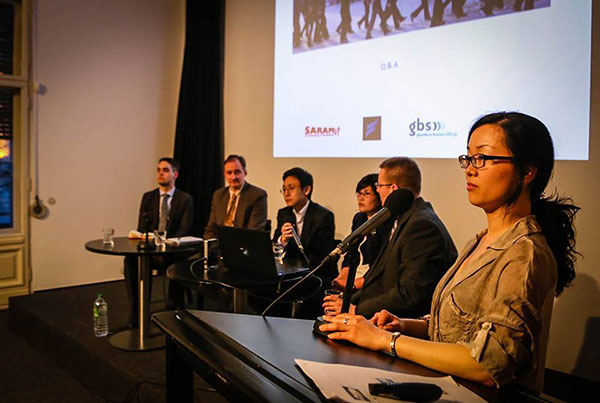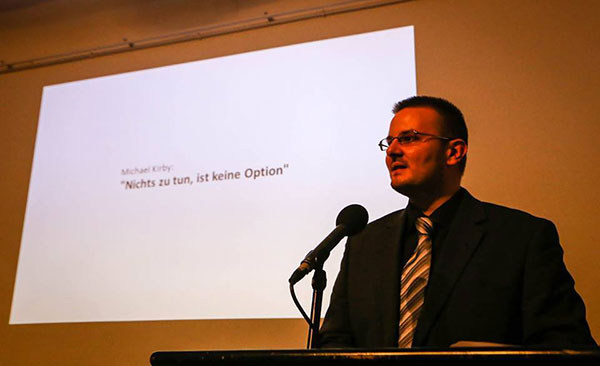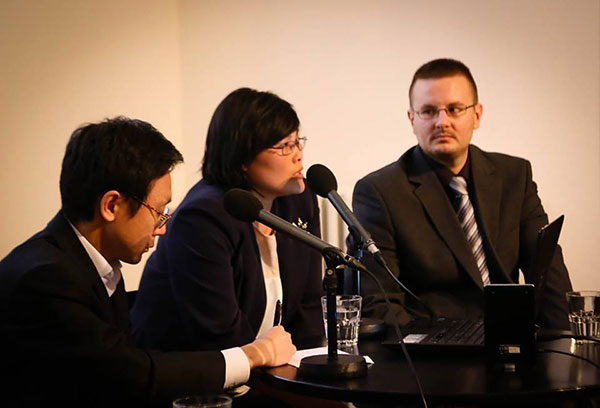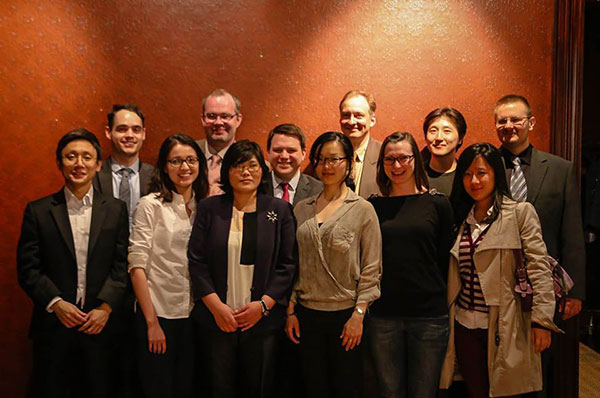Human Rights in North Korea: International Challenge and European solutions

ЈЯSara Elro Photography
It was the first time in Germany that Jihyun Park described her life in North Korea and as a refugee in China. At the event, which was jointly organized by the European Association Alliance for Human Rights in North Korea, Saram and the Giordano Bruno Foundation, the solutions to improve the human rights situation of North Koreans were presented. We also reported on the expulsion of employees of two charities from North Korea.
Under the title "Human Rights in North Korea: International challenge, European solutions" this event was jointed organized by eV from Saram, the Giordano Bruno Foundation and the European Alliance for Human Rights in North Korea during the Berlin Foundations Week.

ЈЯSara Elro Photography
After a welcoming address by the Chair of Saram, Yvonne Yung Hee Bormann, Nicolai Sprekels (also board member of Saram) gave a brief introduction to the situation in North Korea, in order to give to the audience necessary information to understand other lectures and recall and refer to the crimes against humanity in North Korea, as they have been detected by the report of the UN Commission on Human Rights in North Korea.
Sprekels mentioned the Songbun-caste system and the Juche idea as the instruments used by the regime to stabilize it, and pointed to political teachings and forced participation in mass events as tools to suppress the population. In particular, he gave the example of the commitment of North Korean citizens to record a journal, in which not only their own "transgressions" against the ruling doctrine must be recorded in minute detail, but also those of their own friends, neighbors and family members.
Last but not least, Germany has successfully overcome the division. Because of this experience, Germany could serve as a model for a cautious rapprochement between the two Koreas.
Before going to the lecture of Jihyun park, Sprekels explained the special situation of North Korean refugees in China. In China, North Korean defectors are not recognized as such, but considered as economic migrants. Therefore, when they are caught, they are forcibly repatriated. To permanently live in security, it is therefore not only necessary for refugees to successfully escape from North Korea, but also to go undetected by China in a safe third country.

ЈЯSara Elro Photography
After Sprekels, Jihyun Park then described the story of her escape from North Korea.
She was born in the city of Chongjin, which lies in the north-eastern province of North Korea, in the 1960s and grew up in a middle class family. After majoring in mathematics and science, she worked as a teacher. Her 'happy' period came to an end when her mother was forced to flee to China to escape debt collectors, and her father was therefore subjected to repression from the state. During the famine, she had to witness her uncle dying from malnutrition. Also, her brother, who had deserted from the North Korean military and was hiding with them, was severely mistreated by the authorities. Her father became ill and died in the midst of such hardships.
Therefore, the sisters decided to leave the country in 1998 to China, where they hoped to meet her mother. When they arrived in China, Ms. Park, however, was sold by traffickers to work on a Chinese farm and got pregnant there. In 2004 she was discovered by the Chinese authorities and sent back, leaving her son to North Korea, where she was sentenced to forced labor under inhuman conditions in a labor camp. Due to a terrible leg infection, the limb was so seriously damaged that she was released from the camp. Then, she could have the renewed flight to China. She finally met her son in China and they finally succeeded to arrive in the UK.
In the third part of the event, James Burt of the European Alliance for Human Rights in North Korea presented the approaches that the European states can take to influence the situations in North Korea.
1. A review of the cooperation between Member States
European politicians do not understand how North Korea is ruled, and believe that it is not possible to talk to the North Korean leadership on human rights. They negotiate with North Korean institutions who have little power and influence. Burts suggests that European states reach out to information channels that are outside the control of the North Korean leadership to strengthen in order to understand how the regime works and in what form the human rights are violated.
2. An improvement in the protection of North Korean refugees
Due to an ever more rigid legislation in the EU, it is increasingly difficult for North Korean refugees to find refuge in Europe, in contrast to South Korea where these people are automatically granted with citizenship. It is therefore necessary that the legal conditions are created so that North Korean refugees are granted with asylum in the EU.
3.Anhaltender pressure in North Korea by the international community
North Korea is not immune to criticism and so in 2014 North Korea partialy accepted the suggestions of the Universal Periodic Review of the UN Human Rights Council. Europe could pressure the actual implementation of these proposals.
In conclusion, Burt emphasized that Europe's policy should contribute to an improvement for the North Korean population.
German Agro Action: State leader expelled
It was recently announced by Reuters that Regina Feindt, the project leader of the German Agro Action for North Korea, was expelled in late February 2015. A little later, her colleague Karl Case, who spent twelve years in North Korea, also left the country. As a result, the North Korean ambassador to Germany was summoned twice to the Foreign Office.
Iurrently three employees of the organization are still in the country for the projects to improve water supply and sewage system. Whether and how the German Agro Action will continue to work in North Korea seems not yet been clarified.
Since 1997, the German Agro Action has been active in North Korea. At that time, the country suffered from a famine which caused the deaths of between hundreds of thousands and up to two million people. After the famine, the projects Welthungerhilfe walked increasingly in the direction of "helping people help themselves": Through small greenhouses that can be set up by the people on roofs or balconies, the living conditions of the urban population could be improved. And agriculture can be promoted, for example by growing food, which are adapted to the climate of North Korea. So when the rice stocks are exhausted, potatoes can satisfy the supply gap that occurs every year in early summer.
A little later, the North Korean news agency KCNA spread the message that Sandra Suh, the founder of the US organization Wheat Mission Ministries, was also expelled from the country. In this case, their transgressions were clearly stated: in Suh, in the last two decades, has secretly taken photos and videos in North Korea and has used them abroad as a propaganda material against North Korea.
On the website and the Flickr account of the Organisation, photos and videos have been removed. Whether the publication of images on these platforms led to the expulsion is unclear. Images from orphanages or hospital wards were published by the organization. The poor conditions of the facilities were indeed clearly recognized, but such and much more dramatic pictures have been published by other organizations.
Wheat Mission Ministries has worked for North Korea since 1989. The organization has brought 2 million dollars worth of aid a year to the country.
Meanwhile, the Office for the Coordination of Humanitarian Affairs of the United Nations published a report that 27.9 percent of the North Korean population are suffering from chronic malnutrition and 4 percent, from acute malnutrition. It is not sure, though, that 18 million people (about 70 percent of the population) have adequate nutrition.
News Headlines
Entry ban for tourists, which was in effect from March 2015, was canceled. The travel warning of the Foreign Ministry of North Korea has been withdrawn. The 21-day quarantine period, which was originally applied to Pyongyang foreigners as well as residents who return from trips, will be applied only to persons coming from affected by Ebola States.
Reportedly a North Korean couple to have been arrested in Pakistan because of their illegal sale of alcohol. They were released shortly thereafter because it turned out that they were employees of the North Korean embassy. In March an ambassador of North Korea to Bangladesh was held because he had tried to smuggle 27 kilograms of gold in the country in his hand luggage.
SARAM e.V.
www.saram-nk.org

ЈЯSara Elro Photography

